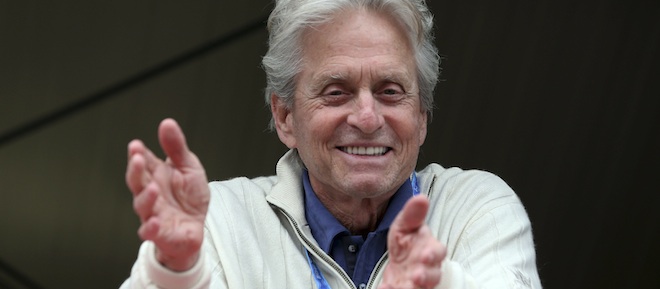Michael Douglas, expert third-baseman, misses a public-health home run
Julia Belluz on the latest celebrity health headline
US actor Michael Douglas smiles as he watches from the Ferrari pits during the qualifying session, at the Monaco racetrack in Monaco, Saturday, May 25, 2013. The Formula one race will be held on Sunday. (AP Photo/Luca Bruno)
Share

Another week, another celebrity health revelation.
In a Guardian article timed around his TV appearance as Liberace, Michael Douglas discussed sex and cancer.
During the interview, to the surprise of many, he linked his cancer to cunnilingus.
Douglas was asked if he felt any remorse for his years of smoking and drinking—both known causes of cancer at the base of the tongue, where Douglas had a walnut-sized tumour. “No,” he replied. “Because without wanting to get too specific, this particular cancer is caused by HPV, which actually comes about from cunnilingus.”
Since the interview went viral, Douglas’ spokesperson came out to backpedal, denying the 68-year-old was blaming his cancer on oral sex. (The Guardian stands by its report, releasing a transcript and audio from the interview.)
Beyond the about-face, there’s more science-ish in this latest Hollywood health confession: It seems like every time Douglas has a new product to promote, he emerges to cherry-pick a new cause of head and neck cancer.
In 2010, he divulged he had a tumor while on media rounds for Wall Street: Money Never Sleeps. Back then, he explained: “This particular type of cancer is caused by alcohol and drinking.” Many, including your faithful correspondent, reported on the lesser-known link between alcohol and oropharyngeal cancer.
Now he’s blaming the human papillomavirus or HPV. A Science-ish colleague guessed that Douglas, a former sex-addict, might be asserting his masculinity in time for his appearance as the flamboyantly gay Liberace by reminding the public he is proficient at cunnilingus. But no matter the reasons for his admission, he’s misleading his audience.
“Nobody’s really made a causative association between oral sex and tongue-base cancer,” said Dr. Jeremy Freeman, a specialist in head and neck oncology at the University of Toronto. “While one would like to make that association, there’s no compelling evidence that exists. It’s conjecture.”
In the past, smoking and/or excessive alcohol consumption were the best-known causes of the disease. But during the past decade, as more non-smokers and non-drinkers presented with cancers of the head and neck, molecular studies on their specimens revealed they had HPV and the virus emerged as a risk factor. “The whole demographic of this disease is changing,” said Dr. Freeman, since HPV-associated head-and-neck cancers are on the rise, while the tobacco- and alcohol-induced cases diminish.
So now doctors look for two types of oropharyngeal cancer: HPV-positive and HPV-negative. As explained by Dr. Jonathan Irish, chief of the department of surgical oncology at the Princess Margaret Cancer Centre in Toronto, HPV-negative patients (the classic smoker-drinker types) usually present around the age of 65, whereas HPV-positive patients tend to be closer to middle age and mostly male. The latter group also has a higher survival rate.
Still, the medical community is grappling with the question of why one person will get an HPV-related cancer and another will not. The authors of this epidemiology of oral HPV infection in the U.S. point out that people who have more sex partners and consume more cigarettes seem to be at a higher risk of getting the virus in the oral cavity. But the particular sexual behaviour that’s to blame is unclear.
Dr. Irish put it this way: “It’s how heavy you smoke, how heavy you drink, how heavy you have sexual practices with oral sex, and the number of people you have sex with. It’s not as simple as ‘oral sex causes cancer.’”
He pointed to the latest science presented at the American Society of Clinical Oncology meeting. “There is no need for patients who have developed cancer from an oral HPV infection to refrain from sex with their spouses or long-term partners,” a report from last week’s conference stated. “The study found that the spouses of patients with oral cancer caused by HPV did not have a significantly higher risk of developing the disease than the general population.”
So not only did Douglas confuse and over-simplify, he also missed an opportunity to improve the public’s understanding of a complex disease. “He not only smoked, and reasonably heavily, and drank alcohol, but he’s also HPV positive,” said Dr. Irish. “To separate one factor from another is very difficult because we know smoking, alcohol and perhaps HPV-contracted sexual practices may have contributed to his disease. But he could have contracted this disease from smoking and drinking if he had been celibate.”
In a final science-ish flourish, the Basic Instinct and Fatal Attraction star claimed cunnilingus is “the best cure” for his “sexually transmitted” cancer. Wishful thinking, pseudoscience machismo—and yet more evidence celebrities can’t be trusted with public-health messaging. Then again neither can the media — at least according to Douglas’ spokesperson.
Science-ish is a joint project of Maclean’s, the Medical Post and the McMaster Health Forum. Julia Belluz is the senior editor at the Medical Post. Got a tip? Seen something that’s Science-ish? Message her at [email protected] or on Twitter @juliaoftoronto